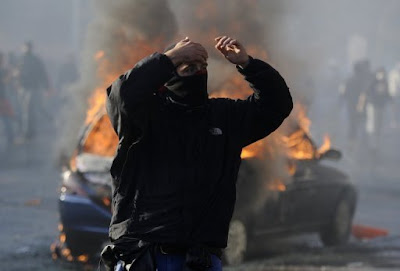 |
| Tens of thousands took to the streets of the Italian capital for a march that turned violent (AFP, Filippo Monteforte) |
 |
| A South Korean protester holds a banner during the "Occupy Seoul" rally (AFP, Park Ji-Hwan) |
 |
| An estimated 2,000 people participated in the Vancouver occupation (AFP/Getty Images, Jeff Vinnick) |
 |
| Nearly 100 protesters were arrested as thousands marched in New York (AFP, Emmanuel Dunand) |
ROME — Protesters torched cars and smashed up banks in Rome while clashes erupted in New York's Times Square on a day of worldwide demonstrations against corporate greed and government cutbacks.
Tens of thousands took to the streets of the Italian capital for a march that turned violent and equal numbers rallied in Madrid and Lisbon. In New York, where thousands protested, more than 70 people were arrested.
The protests were inspired by the "Occupy Wall Street" movement in the United States and the "Indignants" in Spain, targeting 951 cities in more than 80 countries around the globe.
It was the biggest show of power yet by a movement born on May 15 when a rally in Madrid's central Puerta del Sol square sparked a worldwide campaign focused on anger over unemployment and opposition to the financial elite.
"I think it is very moving that the movement that was born here has extended throughout the world. It was about time for people to rise up," said 24-year-old Carmen Martin as she marched towards Puerta del Sol.
In Rome, which saw the worst violence of the day, the march quickly degenerated into running street battles between groups of hooded protesters and riot police who fired tear gas and water jets into the crowd.
"Today is only the beginning. We hope to move forward with a global movement. There are many of us and we want the same things," said protester Andrea Muraro, a 24-year-old engineering student from Padua.
"Only One Solution: Revolution!" read a placard. One group carried a cardboard coffin with Italian Prime Minister Silvio Berlusconi's name on it.
Berlusconi later condemned the "incredible level of violence" at the march, which took place amid a security lockdown.
"We've seen the worst of Europe today in Rome," Mayor Gianni Alemanno said.
Seventy people were injured in the clashes and treated by medics, including three who were in a serious condition, Italian news agency ANSA reported.
Backing from Italy's main trade unions and student movements boosted the numbers at the protest in Rome -- in contrast to most of the other rallies.
The protests received unexpected support from Italian central bank governor Mario Draghi, a former executive at Wall Street giant Goldman Sachs set to take over as president of the European Central Bank.
"They're angry against the world of finance. I understand them," Draghi added, though expressing regret at reports of violence.
In the Portuguese capital, where some 50,000 rallied, Mathieu Rego, 25, said: "We are victims of financial speculation and this austerity programme is going to ruin us. We have to change this rotten system."
Protests were staged throughout Europe in Amsterdam, Athens, Brussels, Geneva, Paris, Sarajevo and Zurich. Thousands also rallied across Canada and in New York, Washington and Miami.
Scuffles broke out in London, where about 800 people gathered in the financial district by St Paul's Cathedral, raising banners saying: "Strike back!" "No cuts!" and "Goldman Sachs is the work of the devil!"
Five people were arrested, three for assaulting police officers and two for public order offences, Scotland Yard said.
Three lines of police, and one line at the rear on horseback, blocked protesters from heading to the London Stock Exchange and pushed back against lead marchers, some wearing masks.
"One of the reasons why we support what is happening here in 'Occupy London' is because the banking system in London is the recipient of corrupt money," Wikileaks founder Julian Assange said from the steps of St Paul's, flanked by bodyguards.
The European Union also became a target for anger as the eurozone debt crisis continues, with some 9,000 protesters marching to the EU's headquarters in Brussels and rallying outside the ECB's headquarters in Frankfurt.
In the United States, at least 74 protesters were arrested as thousands marched in New York. Police on horseback clashed with protesters in busy Times Square in the evening, and one woman was injured.
"I am happy to see so many people, but this would be bigger if the police didn't block the way," said protester Ronny Nunez.
At least 2,000 marched in Washington, while in Miami, a city that rarely hosts mass demonstrations, at least 1,000 people marched downtown to vent their anger against corporations, banks and war.
More than 10,000 Canadians blew bubbles, strummed guitars and chanted anti-corporate slogans at peaceful protests in cities across the country.
"I believe a revolution is happening," said 30-year-old Annabell Chapa, who brought her one-year-old son Jaydn along in a stroller to Toronto's Saint James Park.
In Mexico, Peru and Chile, thousands marched to protest what they slammed as an unfair financial system and stagnant unemployment.
As the day began, around 500 people gathered in the heart of Hong Kong's financial district to vent their anger. About 100 demonstrators in Tokyo also voiced fury at the Fukushima nuclear accident.
Another 600 demonstrators in Sydney set up camp outside Australia's central bank, where the plight of refugees and Aboriginal Australians was added to the financial concerns.

























2 comments:
It's sad that eventhough khmers got hit the hardest by the rich (the rich destroy their homes, took their land, abuse their families, rape their children), but they stay complete silent while everyone else in the world are protesting. Why? khmers, why?
WALL STREET is an organization created by the richest and powerful in the world.
Post a Comment